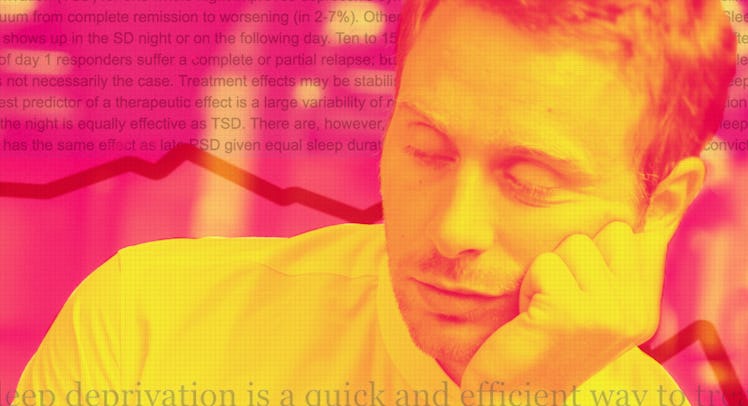Why Scientists Are Using Sleep Deprivation to Treat Extreme Depression
Medically induced sleep deprivation can help with extreme cases of depression, but that's no excuse to stay up all night.

Over time, lack of sleep can cause problems from obesity and cardiovascular disease to a variety of mental health problems. Yet, surprisingly, scientists are actually using sleep deprivation to treat depression. Experts argue that in extreme cases it’s an effective — if somewhat paradoxical — way to rewire the brain. For some new parents, this will come as welcome if slightly unnerving news.
“Helping them stay awake for a longer time will help build some neurotransmitters,” Jagdish Khubchandani, a professor of community health at Ball State, tells Fatherly. “It can be like a jumpstart for a few people in a few circumstances.” However, it’s not as convenient of a shortcut to happiness as sleep-starved parents may have hoped.
That said, it’s not exactly too good to be true either. Medically induced sleep deprivation, otherwise known as wake therapy, is a more effective form of treatment for depression compared to medication and works up to 60 to 70 percent, according to the research. Throughout the process, patients are kept awake all night, or get only a few hours of sleep, and stay awake the following full day. This is typically followed by a night of recovery sleep — a cycle that can be repeated for up to five days. During this time the neurotransmitter adenosine builds up in individuals, creating the feeling of tiredness, which animal studies indicate may be responsible for the antidepressant of sleep loss.
Still, doctors, to some extent, alleviate the symptoms of depression by triggering a hypomanic episode, Khubchandani explains, which is why it should only be prescribed in acute and severe bouts of depression when patients can’t get out of bed, eat, or even talk sometimes, as an emergency and temporary course of action. When these particular patients pull all-nighters, they don’t display the typical problematic symptoms of mania, such as hypersexuality or compulsive spending, because their baseline is lower than people with higher functioning depression.
Simply, one car’s jumpstart is another car’s tire fire.
As effective as sleep deprivation can be in the short term, patients report that depressive symptoms return about 80 percent of the time. Likewise, most research illustrating the efficacy fails to follow patients longer than a week, so very little is known about the depression rebound, not to mention the other health risks that may be raised from controlled sleep deprivation, Khubchandani notes. While there is a large body of research that confirms the health risks of poor sleep are consistent and severe, very little is known about the toll wake therapy can take on a person’s body in the long-term.
For these reasons, sleep deprivation is more comparable to Electroconvulsive therapy (ECT), or shock treatments, than antidepressant medications, Khubchandani says. It’s a drastic measure that makes sense for some people under very specific conditions — but only if nothing else has worked, and even then it’s not effective for everyone. When it does work, it’s not a sustainable way to treat depression and is best combined with other forms of symptom management such as diet, exercise, medication, and talk therapy.
It may seem convenient to self-prescribe wake therapy if you were going to be up all night with a baby anyways. But since you wouldn’t try shock therapy at home, these experiments are best kept in the lab as well.
“My fear is that people would try this at home. That should not be done.”
This article was originally published on